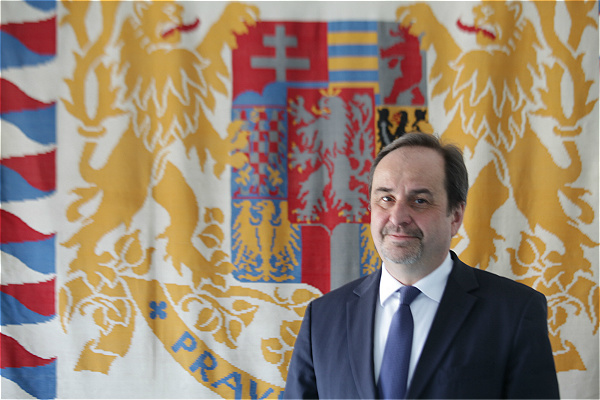 |
|
Jan Kohout, an adviser to Czech President Milos Zeman on Chinese matters [Photo by Fu Jing/chinadaily.com.cn] |
President Xi Jinping's Belt and Road Initiative is essentially a peace project, which has surpassed economic benefits and is connecting people of different countries, said Jan Kohout, an adviser to Czech President Milos Zeman on Chinese matters.
Kohout made the comments before Xi's three-day visit to the Czech Republic.
"President Xi's Belt and Road Initiative is a solution for the world to walk out of wars and conflicts and bring about prosperity. It is not only about business but focuses on bringing people closer, leading to better communication and cooperation," said Kohout during an interview with China Daily.
"The world is filled with troubles and challenges ranging from those in the Middle East, Syria, Afghanistan, and North Africa. And avoiding misunderstanding and conflicts are essential and in my understanding this is basically what this initiative is about."
Calling Xi as "Father of Belt and Road Initiative, Kohout, who has been foreign minister of Czech twice, said this initiative is political but China has no geopolitical consideration. "China is not pushing each country to join, and China is not putting pressure. This is mutual. It is up to every county to decide."
Based on his long-time engagement with Chinese leaders, businesses, academia, Kohout has set up New Silk Road Institute Prague in September 2015 in response to the ongoing and accelerating geopolitical and economic changes in the world.
Kohout said his institute, above all, is similar to the connotation of Xi's proposal, which aims to assist in building better world of communication, not the world of purposeless confrontation.
Kohout said under the framework of One Belt and One Road Initiative, his institute will create positive environment for cooperation and offer suggestions to the leaders and governments of both sides.
He believes that the driving forces behind the New Silk Road are definitely the economic benefits for both continents and that increase connectivity between Asia and Europe, such as high-speed railways, network of highways, smart air and sea infrastructure and high-speed data networks and sustainable energy infrastructure.
"Nevertheless, this idea should not be reduced to economic benefits only. We should not understate the importance and effects it has on areas such as education, culture, mutual understanding and ideological interactions," said Kohout. "All these are integral components of the new grand project design."
And the institute will focus on more specific areas and give more concrete suggestions especially on feasible infrastructural and logistic projects, financial cooperation, energy technology.
"We focus on highway, high-speed train and infrastructural prospects and also focus on soft projects. This is what we aim for. But right now, we are looking forward to President Xi Jinping's visit, which is historic for us," said Kohout.
Calling his institute a pioneer in Europe, he said during Xi's visit, both sides will look deeper to cooperate on Belt and Road Initiative.
Kohout said President Zeman has visited China and he is great supporter and promoter of Czech-China relations and he strongly supports Belt and Road Initiative.
"Czech government, businesses have also shown strong support on this initiative. So all these are very encouraging," he says. "So we can start to implement more focused projects on infrastructure, trade, finance, for example."
As to the high-speed railway, Kohout said his president was impressed by China's high-speed train from Tianjin to Beijing and other officials were also impressed by this bullet vehicle.
"They have believed it is high-end technology and there is no doubt about Chinese companies' competitiveness in building the railway," said Kohout. "And technology is needed not only here but also in Central Europe."
He said now China is helping start to construct high-speed railway between Budapest and Belgrade and possibly this railway will also aim to extend southward and northward.
He said the Czech Republic and Germany are going to build high-speed railway between Germany city Dresden to Prague, reducing the Dresden - Prague journey time from 2h 15min to just 50 minutes.
"This is a small start but it is difficult to implement big infrastructure projects due to environmental impact assessment and the public joining decision making," said Kohout.
But if Chinese companies should want to invest in such projects in Europe, he said they should come two or three years earlier than the tender is open. "It is important to get involved locally before you jump in the sky for tendering," said Kohout.
As to the Czechs not joining AIIB as founding member, Kohout said it was a big mistake.
"I will create positive atmosphere to keep this on government agenda to become part of AIIB. I will bring more arguments to keep it still alive and explain to experts, to the members of parliaments," said Kohout. "I am optimistic and will work on that."